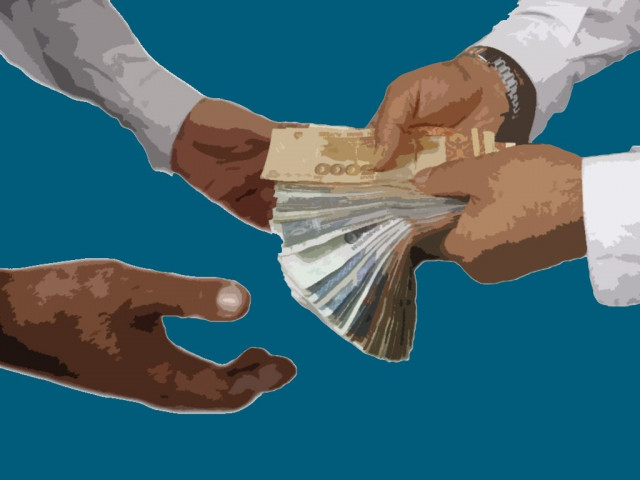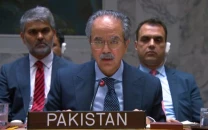Survey reveals Afghan officials accepted bribes worth $3.9 billion
Education sector reported to be most vulnerable to corruption.

50% Afghans paid bribes to
government officials last year. PHOTO: FILE
The findings of a joint survey conducted by a United Nations mission and an Afghan anti-corruption panel reveals that Afghan officials accepted $3.9 billion in bribes last year. This marks an increase of 40% since 2009.
The report was released just weeks after Afghanistan secured third place on the list of the most corrupt countries by Transparency International in its annual Corruption Perceptions Index.
“In 2012, half of Afghan citizens paid bribes for a public service,” the High Office for Oversight and Anti-corruption (HOO) and the UN Office on Drugs and Crimes (UNODC) survey disclosed on Thursday.
The survey was based on a sample of 6,700 Afghans aged 18 and above across the country, including 42% women.
Bribes paid in 2012 is double the amount of Afghanistan’s gross domestic product and a fourth of the amount committed in the Tokyo pledge, commented the UNODC’s regional representative Jean-luc Lamahieu. While nobody doubts the seriousness of the issue, a strategy to counter the situation needs to be designed, he added.
Afghan Anti-Corruption Network (AACN) Chairman Mohammad Shafiq Hamdam said the UNODC report on corruption reflects the unfortunate reality of Afghanistan.
“Lack of political willingness and accountability mechanism, weak rule of law, circle of immunity and safe havens for corrupt officials inside and outside the country are the major causes of corruption,” Hamdam told The Express Tribune.
If the Afghan government does not control this, it will lose the support of its international partners, he added.
Nearly 30% of Afghan citizens paid a bribe requesting a service from the private sector, while 50% paid bribes to public officials. The national economic impact of non-governmental bribery costs an estimated $600 million, the survey said.
The public sector is mostly bribery-stricken in the western and north-east regions of the country, where 71% and 60% of the population accessing public services paid bribes. In the southern and central regions, the numbers average at about 40%.
Apart from public servants, village elders, clerics and Taliban groups are mostly involved in receiving bribes (60%) in the south.
“Afghans know that corruption negatively affects their society. The solution not only lies with the government, but also in the wider community,” Lemahieu said.
Bribery has become an acceptable part of life, however, which is heavily embedded in the social practice and patronage.
For instance, 68% of those surveyed in 2012 considered it acceptable for a civil servant to accept small bribes for services as opposed to 42% in 2009, according to the survey. Similarly, 67% of respondents considered it acceptable sometimes for a civil servant to be recruited because of influential family ties and friendships.
The past three years have also seen alarming trends emerging. The average cost of a bribe has increased from $158 to $214, a 29% difference.
The education sector has proved to be the most vulnerable to corruption, with more people paying bribes to teachers. The sector has experienced more than a three-fold increase with almost 51% people paying bribes to teachers compared to 15% in 2009.
Public sectors, including the judiciary, customs and local government services have maintained the same levels of corruption in the past three years.
Who accepts bribes?
According to the report, prosecutors, teachers, judges and customs officials are most likely to accept bribes. Other officials vulnerable to bribery in Afghanistan are tax/revenue officials and police officers, while a notable increase in vulnerability has also been seen in service members of the Afghan National Army.
Doctors, nurses and paramedics are not immune to bribery either, and account for about 20% of the officials being bribed.
Haji Farid, a former Afghan parliamentarian, said US interests and the weak Karzai government is responsible for the situation. “The Afghan system is still in the hands of foreigners and Afghan authorities are powerless. Ending corruption is not their priority.”
Published in The Express Tribune, February 9th, 2013.



















COMMENTS
Comments are moderated and generally will be posted if they are on-topic and not abusive.
For more information, please see our Comments FAQ